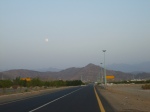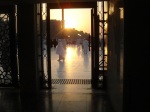Previous posts in this series: Parts 1 to 22

Wuqoof on Arafah (Hajj 2011)
Hajj is Arafah
Zawaal time soon came, and minutes later, we made our Thuhr and Asr salaah combined – as is sunnah (though some disagree on that). Right after that, lunch was announced. For me, it was a really ridiculous time for food to be served. We had entered wuqoof time, but if we didn’t get our food early, we risked missing out completely in case it was all gone (which wasn’t wise, considering there was no food provided until the next day). But we didn’t control the schedule, so we had to accept that time and make the best of it.
To avoid the risk, as well as longer queues later, I took my food early. I was careful to take only a little, since we were advised to not overdo it as we wouldn’t want to be bloated and tired in these priceless few hours (not to mention needing the toilet).
After lunch, I settled down in the tent and started on my own efforts for the afternoon. Any thoughts of talking to others vanished, because now was not the time to talk to any human being. It was my private, most special time with Allah. When I first became more committed to the deen, dua was my first love in terms of ibadah. It was through dua that I took my initial steps deeper into Islam. Dua was what drove me closer to Allah, and Allah used that as the gateway to changing my life so completely – from one of aimlessness and ignorance to one of purpose and knowledge. Now, in these few hours, I had the ultimate chance to make dua. And so I began.
However, as it often happens in life, things don’t always go according to plan. My wife and I had agreed that we’d spend some time together on Arafah making dua. Much sooner than I expected, she phoned to ask that we go and do that – since she wasn’t finding much privacy or dua-conducive conditions in her tent. It’s important to note that doing this was a completely non-romantic thing – since romance is totally prohibited in ihraam. The entire focus was spiritual, but there was still a special, non-physical intimacy to the moment. As a married couple, it was an incredibly beautiful experience, and one that we weren’t alone in (we saw other couples doing the same). For me, it also re-emphasized the sacredness of the bond of marriage. How beautiful it is to base your marriage on the foundation of deen, and how amazing it is to be united in ibadah.
Alone time
After making our duas in a quiet spot, we separated and went off to continue our wuqoof alone. I sought out a private spot – where nobody would interrupt me and the sounds of conversations and loudspeakers would be minimal. After some searching, I found a very distant yet secluded area – in the corner of our section, behind an African camp.
I continued with my own duas, running through an enormous paper list that was already physically worn out from the previous weeks of folding and unfolding. Some of those duas felt very sincere and emotional, but my enduring feeling for most of that time was one of frustration. I figured that my group would be leaving Arafah early – 2 hours before sunset – so I had a very limited amount of time to make my duas. We were told that when we left, for much of our walk we’d still be on Arafah, so we could still make our duas as we walked. But I was hesitant about that, because I’d made many duas on the move in the past and I knew how difficult it is to concentrate under those conditions.
So I felt like it was now or never. I only had about an hour on my own, and in that time I had to rush through as much of my list as I could so that I would accomplish my goal of making all my duas. Instead of relaxing and giving my duas the time and attention they deserved, I felt pressured and insincere. So instead of savouring the fact that I was on Arafah, able to at least make some duas, I felt short-changed – partially deprived of what was the most precious period of time I’d ever had.
If I had to do it again, I wouldn’t have left early. I did have the option to spend the entire wuqoof period in the camp – until sunset – and head off with the last group to leave. But my wife wouldn’t have wanted that because of the logistical complications. We’d planned to stick with our sheikh, and this was the way he managed his group.
But I couldn’t let the negativity ruin the experience. I had to believe that Allah would fulfil all that I’d asked for, and that which I didn’t get the chance to ask for too – even though I’d made my duas so hurriedly and insincerely. Allah knows best why it turned out the way it did, but I just had to appreciate the experience and have faith that it was the best thing for me.
The split
Knowing time was almost up, I made my way back to the camp, where the group had just finished its collective program. Everyone was very emotional – hugging and wishing each other an accepted Hajj. It would’ve been nice to experience that – because it’s a momentous occasion for us all, and it’s nice to share it with others. But because the group program cut through most of the very scarce personal time available, there was no way I would attend it. As I’ve said before, for me, ibadah is personal, and if it’s a choice between being in a group and being on my own, I choose the latter every time.
At the camp, I wandered around, trying to find out if they’d announced exactly what time they’d be leaving. For most of the day before that, they’d been very non-committal – so we had no idea what time things would happen until they announced it. Every person I asked gave the same answer: no; they’d let us know. So I used that time to hurriedly continue with my dua list – which I finally accepted I’d never finish in this wuqoof.
No announcement came, and I wouldn’t have known the time of departure had I not overheard one of the sheikhs tell someone that we needed to start moving. Of course, with a long walk ahead (roughly 14 kilometres in total for the group’s planned route), it was a pre-requisite that you needed to use the toilet before leaving – especially since there were no facilities on the road.
But as was customary on Hajj, the toilets had queues, so I had to wait a while. After doing my business, as I walked back to the camp, I passed my wife’s cousin – who told me that they were preparing to leave. I just needed a few minutes to get my stuff and would then meet them, so I thought they’d wait for me. But when I came back, they were gone.
I spoke to my wife on the phone, and assumed they were still standing and waiting for people – as was the case for most group activities on this trip. She’d failed to tell me that they were already on their way. The group had left, and she hadn’t waited for me.
But I figured I was only a few minutes behind them, so I would catch up. Everyone was walking in one direction, so there wasn’t much chance of getting lost. With a feeling of anxiety mixed with bravery, I made dua for the journey and ventured off alone – among the not-too-many people leaving at that time.
Little did I know, an immense adventure awaited me…
Related lessons:
- You probably won’t get to choose what time lunch is served, but when it is, make a smart decision as to when to eat – so that you can maximise your dua time while not missing out on the precious food you’ll need to sustain you for the period ahead.
- Try to eat only as much as you need. Over-eating may make you bloated, tired, and in need of the toilet – which would ruin your chances of making the most of your wuqoof.
- I probably don’t need to remind you, but DO NOT WASTE EVEN ONE MINUTE of your wuqoof time. Spend it in dua (or whatever other ibadah you plan to do), and steer clear of people that gossip and waste your time.
- If you’re with your spouse, make some time during wuqoof to make a special dua alone with him/her. It’s an incredibly beautiful experience that will, insha-Allah, bring your hearts closer together and benefit your marriage and family life.
- As for personal duas, you may have trouble finding a secluded spot to be alone. Don’t spend too much time looking – just get away from the crowds and find a spot where that’s good enough (i.e. minimal interruptions / distractions from others).
- Your group may start walking to Muzdalifah early, so if you have the choice to stay until the very end of wuqoof (i.e. sunset), do so if you need to (and if it’s logistically possible). It really is an absolutely unique experience that you shouldn’t compromise. You can go anywhere in the world, spend time right next to the Kabah and in the Rawda, experience tremendous highs in Ramadan – but NOTHING is like this wuqoof. And with the quota systems in place, it may be the only wuqoof you ever get to make.
- If your wuqoof doesn’t live up to your expectations, don’t lose hope and don’t let negativity overwhelm you. Just be grateful for the experience you did have, ask Allah to accept and fulfil all your duas, and be confident that He will do so – regardless of the shortcomings.
- Before leaving Arafah, make sure you use the toilet (since there are none on the road to Muzdalifah) and pack enough provisions (water and a few snacks).
Image source: Here
Coming up next, insha-Allah: Adventures in the desert
What happened next?
Update: The entire series (30 parts) is available at this link – post by post. Alternatively, you can download the complete series as an e-book in PDF format. Feel free to share with anyone you think may benefit.









